Share As A Gift
Share a paywall-free link to this article.
This feature is only available for subscribers.
Start your subscription for as low as $4.95. Already a subscriber?
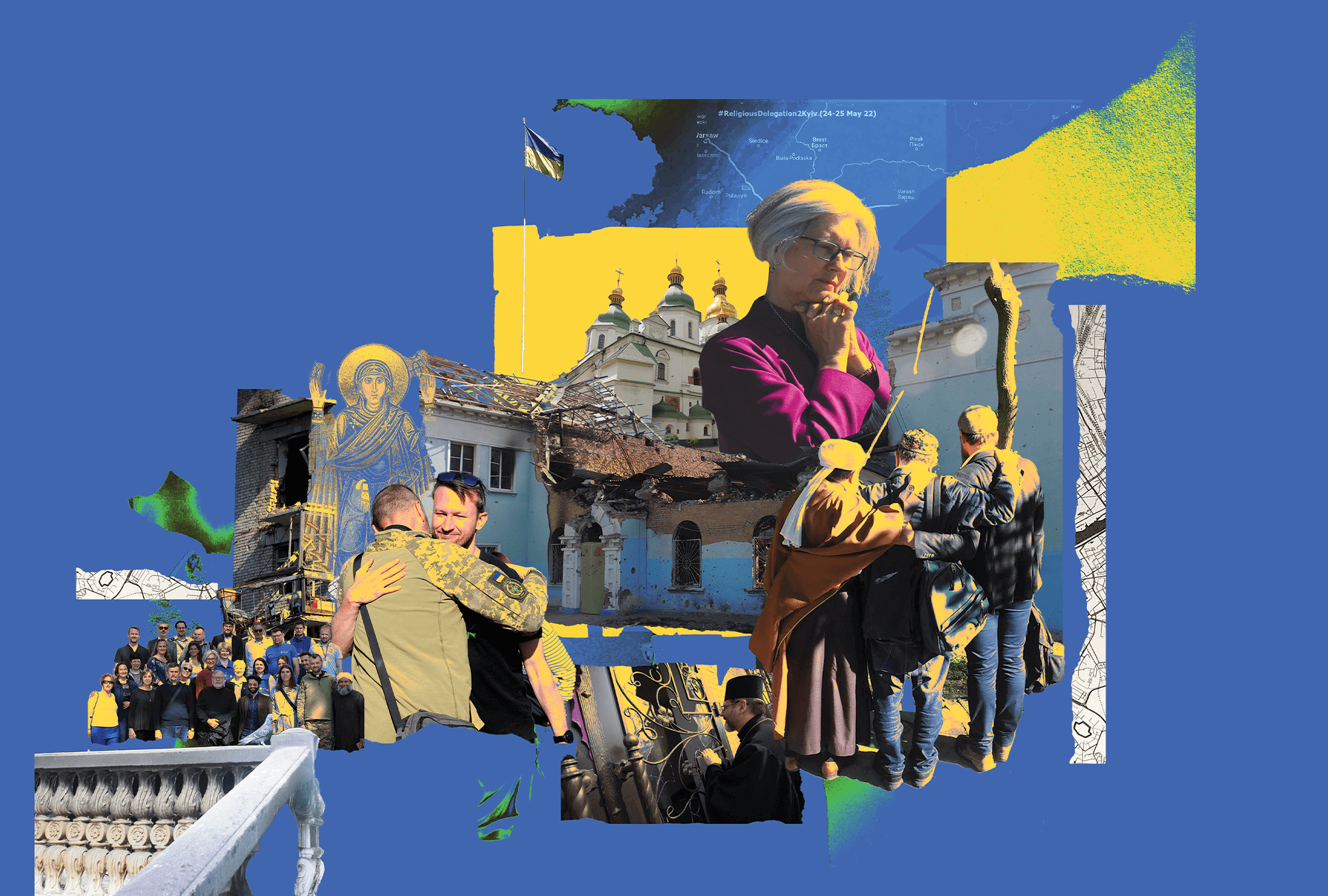
Photographs by Dawid Gospodarek / Photo collages by Candace Sanders
WHEN THE FRONT DESK clerk at the Ibis hotel in downtown Kyiv heard a large travel party entering the lobby, she glanced up in surprise. It was 20 minutes before the 11 p.m. military curfew. Our delegation of 17 international religious leaders had made hotel reservations in the war zone a few days in advance, but few—including the hotel clerk—thought we would make it over the border from Warsaw, Poland, to Kyiv, Ukraine, a city that six weeks earlier was surrounded by Russian military forces.
I smiled at the clerk. American soul singer Sam Cooke’s sweet tenor filled the lobby while we sorted bags and room keys.
I was born by the river in a little tent
Oh and just like the river I’ve been running ever since
After a 14-hour bus ride on a recently demined highway, here we were.
The streets of Ukraine’s bustling capital city of 4 million, divided east to west by the Dnieper River, were relatively quiet. More than 2 million of Kyiv’s inhabitants fled to border countries in February 2022 when Russia’s President Vladimir Putin launched missile attacks on more than half a dozen Ukrainian cities, including the capital.
Within hours of the air strikes, Russian tanks rolled across Ukraine’s borders, amphibious forces landed on the southern coast from the Black Sea, and Ukrainian government internet infrastructure, including the defense ministry, came under a severe cyberattack. The second-largest country in Europe was under a full-scale invasion.
In the five months following the attack, more than 10,000 (a vast undercount) Ukrainian civilians have been reportedly killed or injured, including more than 800 children. The war has displaced nearly half the country’s population, internally or externally.
NINE DAYS AFTER the invasion began, Kyiv’s mayor, Vitali Klitschko, with his brother, Wladimir, dropped a short video on social media inviting religious leaders to come to Kyiv to show their solidarity with the Ukrainian people.
“I express an appeal to the world’s spiritual leaders to take a stand and assume the moral function that is incumbent upon them, and to proudly assume the responsibility of their religions for peace ... Let us make Kyiv the capital of humanity, spirituality, and peace,” said Wladimir Klitschko, who often speaks in English for his brother. “Unity is our key for freedom,” concluded the mayor.
When our delegation arrived in May, we were the first to answer the mayor’s invitation. Our group of peace pilgrims from Italy, the U.K., Poland, and the United States included high-ranking clerics from Jewish, Christian, and Muslim traditions as well as leaders from faith-based civil society organizations such as Operazione Colomba, the nonviolent peace corps of the Pope John XXIII Community in Italy.
Both of the Klitschko brothers are former world heavyweight boxing champions. Vitali rose to political prominence during the Maidan popular uprising (the “Revolution of Dignity”). For 88 days beginning in November 2013, protesters engaged in nonviolent mass mobilization and a wide array of nonviolent strategies in response to then-President Viktor Yanukovych’s failure to sign popular political and economic agreements between Ukraine and the European Union, opting instead for a deal with Putin. Then five days of violent government crackdown left at least four police and 49 protesters dead, according to evidence released in the Maidan massacre trials. Vitali Klitschko (“Dr. Ironfist”) helped negotiate a peaceful end to the crisis.
The appeal to make Kyiv “the capital of humanity, spirituality, and peace” is rooted in Kyiv’s history. Situated on ancient maritime trade routes, the city prides itself on a rich cultural diversity. Most Ukrainians hold fiercely to the vision of a multicultural Ukraine rooted in freedom secured by democratic principles. Western politicians undercut this vision when they assume Ukrainians want to be like Americans. Russian politicians use Western politicians’ remarks to inflame culture wars within Russia against the “deceitful and decadent West led by the United States,” as Reuters framed it. Mayor Klitschko’s appeal was not so much to “make” Kyiv a capital of peace, but to defend and preserve its hard-won history of unity in diversity.
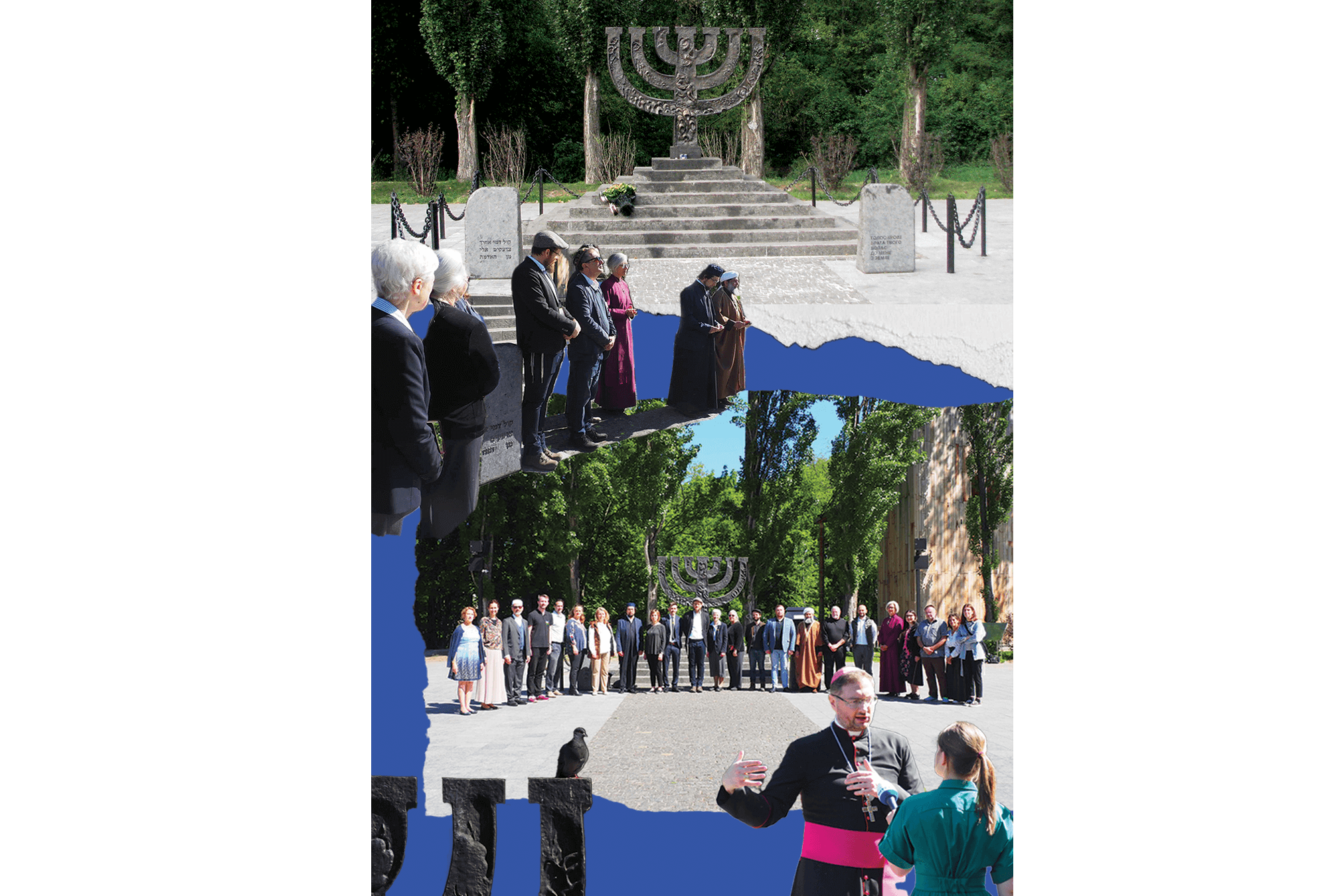
Photographs by Dawid Gospodarek / Photo collages by Candace Sanders
AT THE HOTEL, our group fell exhausted into our beds. An hour later, we woke to air raid sirens. I had to remind myself that this was not a drill. The front desk clerk pulled up an app on her phone to show which siren was sounding and where the missile strike area was likely to be. We were well away from the red zone; nonetheless, she pointed out the route to the bomb shelter.
Our delegation had two goals. First, prove that an international multireligious delegation to Kyiv was possible and replicable. Second, to pray publicly for a just peace. Our first outdoor prayer service was held on May 24 at the Babyn Yar Holocaust Memorial Center, our Ukrainian host, and the next day another service was held at St. Sophia Cathedral, which was built in the 11th century as the heart of Slavic Orthodox Christianity.
Babyn Yar is a vast, lush ravine in the north of Kyiv where a beautiful clear creek used to run. In September 1941, Nazi SS and German police units killed 33,771 Jews in the ravine during a two-day period—one of the largest mass killings at a single location during World War II. Through 1943, German forces continued using Babyn Yar as a killing site for psychiatric patients, Roma, Soviet prisoners of war, and others. It’s estimated that 100,000 people were murdered at Babyn Yar.
Earlier in the spring, we had asked Maksym Rabinovych, director of Babyn Yar, whether it was useful for us to come to Kyiv or if it was better to organize aid from outside. “Come. Just come and see,” Rabinovych said.
Babyn Yar hosts the first modern Holocaust museum in Eastern Europe and a center for “tragedy studies.” On March 1, a TV tower near Babyn Yar was shelled by Russian forces; the attack killed five people.
Beneath a canopy of blue sky and poplar trees, our delegation gathered at the great bronze menorah while violinist Pavlo Kaurov played a haunting solo of Albinoni’s Adagio in G Minor. Rabbi Dawid Szychowski, Orthodox rabbi of Lodz, Poland, and two other Jewish delegation members opened our prayers: “Out of the depths I call You, O Lord, listen to my cry ... If You keep account of our sins, O Lord, who will survive?” (Psalm 130:1,3). Archbishop Visvaldas Kulbokas, the Vatican’s ambassador to Ukraine, led the Lord’s Prayer in Ukrainian.
“For five years our Memorial Center has been studying the history of the Holocaust to prevent genocides and promote human dignity,” Rabinovych said. “We are committed to this aim today in particular, when peaceful Ukrainian cities are suffering from shelling, a lot of houses of civilians are destroyed, and so many people are tortured and killed in a barbaric manner. We truly believe that bringing together the leaders from different fields—religious, politics, science, culture—can show the way how to stop Putin’s aggression, save lives, and restore peace.”
Our public message was simple: “We have come to Kyiv in solidarity to pray for a just peace. God demands that cities are not bombed; the Russian blockade of Ukrainian ports must stop and grain must flow again from Ukraine if we are to avoid hunger and humanitarian disaster; humanitarian aid should increase and humanitarian corridors be provided. We are here to say that we are also open to praying in Moscow for just peace, with the faith communities in Russia.”
The Ukrainian press at this first prayer service soon spread the word that our delegation had arrived. Bishop Jo Bailey Wells, a delegation member representing the Church of England, reflected on the press engagement. “I was amazed how interested, eager the local press was to follow what we were doing,” Wells said. “One of the people who interviewed me ... with tears in his eyes, he said, ‘I am determined to tell the truth. ... My parents have been taken prisoner of war in eastern Ukraine. The Russian troops came looking for me. My parents disowned me and said they did not know where I was.’”
Invitations to meet with us began pouring in. Staff at the office of the president of Ukraine (at that time President Volodymyr Zelensky was at the World Economic Forum in Davos) encouraged future delegations. We prayed with members of the Crimean refugee community in their mosque and viewed the classrooms where little shoes, stuffed animals, and backpacks remained strewn about after the children and teachers fled during the early missile strikes.
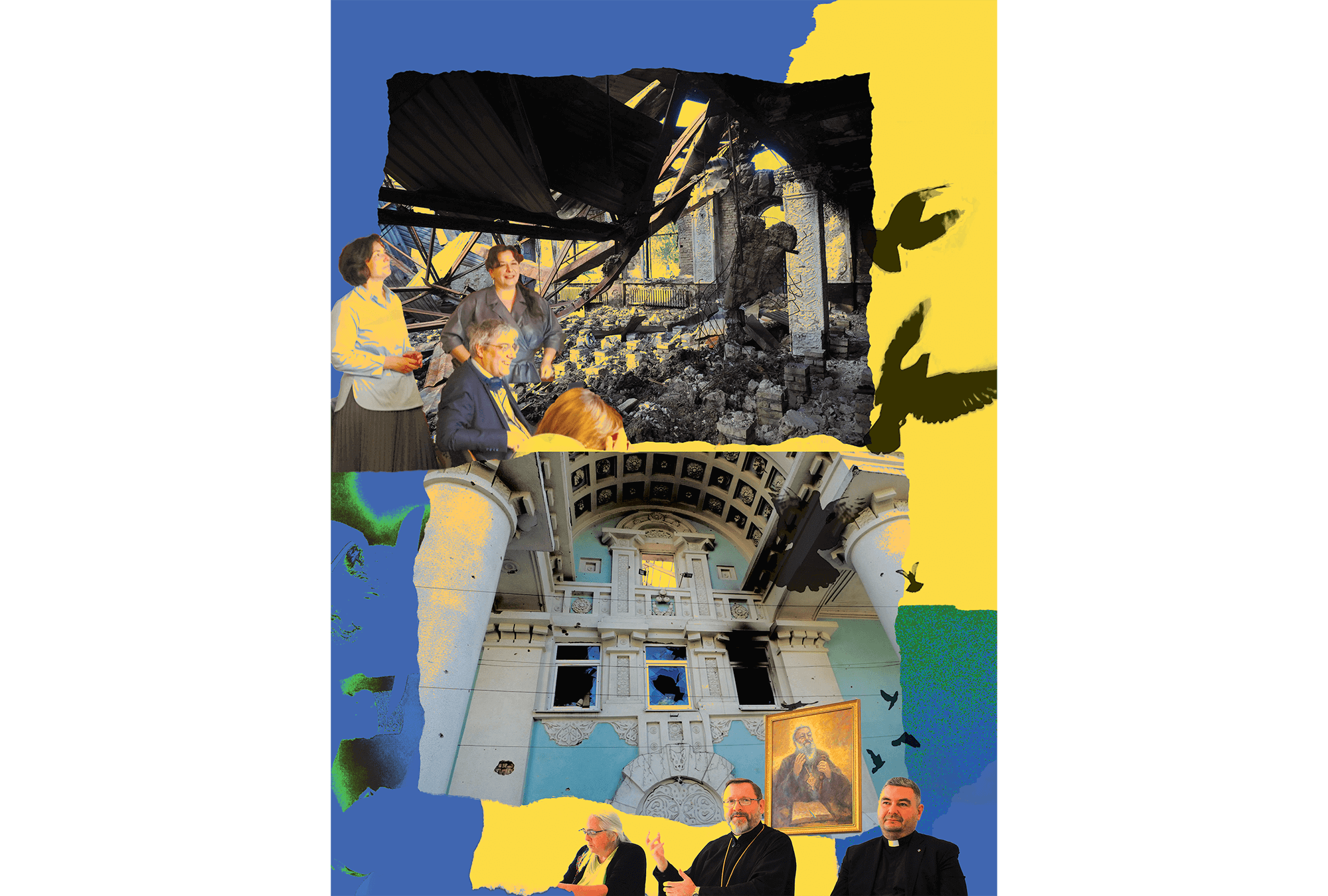
Photographs by Dawid Gospodarek / Photo collages by Candace Sanders / Dove images by Temari 09 - Flickr
IN IRPIN, about 15 miles north of Kyiv, we met Fathers Vitaliy and Myroslav at the Ukrainian Greek Catholic Church of the Nativity of Mary. The priests and 30 members of their community lived in a hastily constructed church basement for two weeks during the vicious “battle for Irpin” (Feb. 27-Mar. 28) while the region was held by the Russian military. In Bucha and Irpin, an estimated 1,000 people were killed, including 31 children. At least 280 bodies of civilians were discovered in mass graves, and an investigation into war crimes is under way.
The priests held shell fragments in their hands and pointed out the bullet holes in the walls of the church and the shattered windows. Each night during the battle, a priest would steal into the church above to retrieve hosts from the tabernacle. Each day, the hidden group would celebrate Mass, as if it were their last.
Major Archbishop Sviatoslav Shevchuk, head of the Ukrainian Greek Catholic Church, had prayed over the bodies as the mass graves were opened in Bucha, which he described as “an open wound on the body of Ukraine.” We met Archbishop Shevchuk at the sprawling complex of the Cathedral of the Resurrection of Christ on the eastern side of the Dnieper. “Each night we hosted 500 people during the time we were surrounded by battles,” Shevchuk said. He described the weeks the community lived in subterranean spaces. “We had a real zoo with all the pets, like Noah’s ark.”
Russia’s military offensive is not a battle between armies. It’s intensely personal. Individual homes in neighborhoods are locked in as missile targets. Names are on kill lists—much like the counterterrorism strategy the U.S. used in Afghanistan for more than 20 years.
“Now the mass graves in Irpin and Bucha have been exhumed and reburied,” Shevchuk said, “but to see a whole family killed—mother, father, little children, even their parrot killed! Why do this?” He added, “I too was on the death list. I stared at that family and knew it might be me. Now that place is one of pilgrimage for people of all faiths. Those who were killing us came here to enact the ‘final solution’ to the ‘Ukrainian question.’”
Shevchuk’s reference to the “final solution” points not only to the 1942 Wannasee Conference where Nazi Party and German government officials devised what they called the “final solution of the Jewish question” but also to a February 2022 commentary by Petr Akopov, a columnist for RIA Novosti, a Russian state-owned domestic news agency, in which he referred to Putin assuming his “historic responsibility” to not leave the “solution of the Ukrainian question to future generations.”
Shevchuk told us what this policy looks like in the places he had visited in eastern Ukraine. It was deeply disturbing and traumatic.
“Sexual violence has become a weapon of this war,” the archbishop said. “I met with those victims and the counselors trying to help them. There are common elements in what they told me: The rape was always public with the intention to publicly humiliate women, men, and children. The rape was to create terror and humiliate civilians who were forced to watch. Now we have learned that the Russian soldiers were not only given permission to rape but were ordered under threat of death to commit these acts of war crimes.”
“HUMANS CAN INITIATE war, but then we become slaves to war,” Archbishop Shevchuk told us. “Only God can stop this war, and we must cooperate with [God].”
At the Central House of Artists, a cultural center in the city center, we met with a handful of Ukrainian peacebuilders struggling to enact the “cooperation” Shevchuk referenced.
Russian American Andre Kamenshikov is Ukraine director for Nonviolence International and regional coordinator of the Global Partnership for the Prevention of Armed Conflict. For 22 years, he was based in Russia and worked on peacebuilding in conflict areas of the former Soviet Union. In 2015, he moved to Kyiv because of an increasingly hostile political climate in Russia.
“Ukraine has given very strong examples of nonviolent action,” Kamenshikov told us, “especially in the occupied territories. There have been large protests even under military occupation. We need training in a wide spectrum of nonviolent responses to the very repressive actions Ukrainians are facing. People need a wider array of tools. Where people are resisting, they can be provided some increased safety by connection with international allies.”
Civilians replaced road signs to confuse Russian military vehicles. They blocked roads with cement blocks and built “Czech hedgehogs” out of iron I-beams to deter tanks. They have set up complex humanitarian aid systems with border countries to distribute food and medicine to the forgotten pockets of the country.
“During the first weeks of the invasion, it was likely that Belarus would join their military with Russia. But there was such popular resistance that the Belarus military did not invade and actually resisted being used by Russia against Ukraine,” Kamenshikov said. “We need a wider range of responses to organized violence than ‘do nothing’ or ‘kill to the end.’ Turning a criminal into an enemy helps nothing.”
Tatyana Bilyk, co-founder of League of Mediators of Ukraine, has dedicated her whole life to peacemaking. Now, she told us, “It is our family’s honor and my greatest pain that my son is fighting to defend our country.”
Before the war, Bilyk’s work focused on addressing conflict mediation within families. She brought her training as a psychologist to the field of social services in Ukraine. “My work now is trauma counseling, particularly among widows,” Bilyk said. “It’s not marriage counseling now. It’s bereavement. How will these women survive? It’s compounded grief and recovery from horrible sexual trauma. Our training has not prepared us for this.”
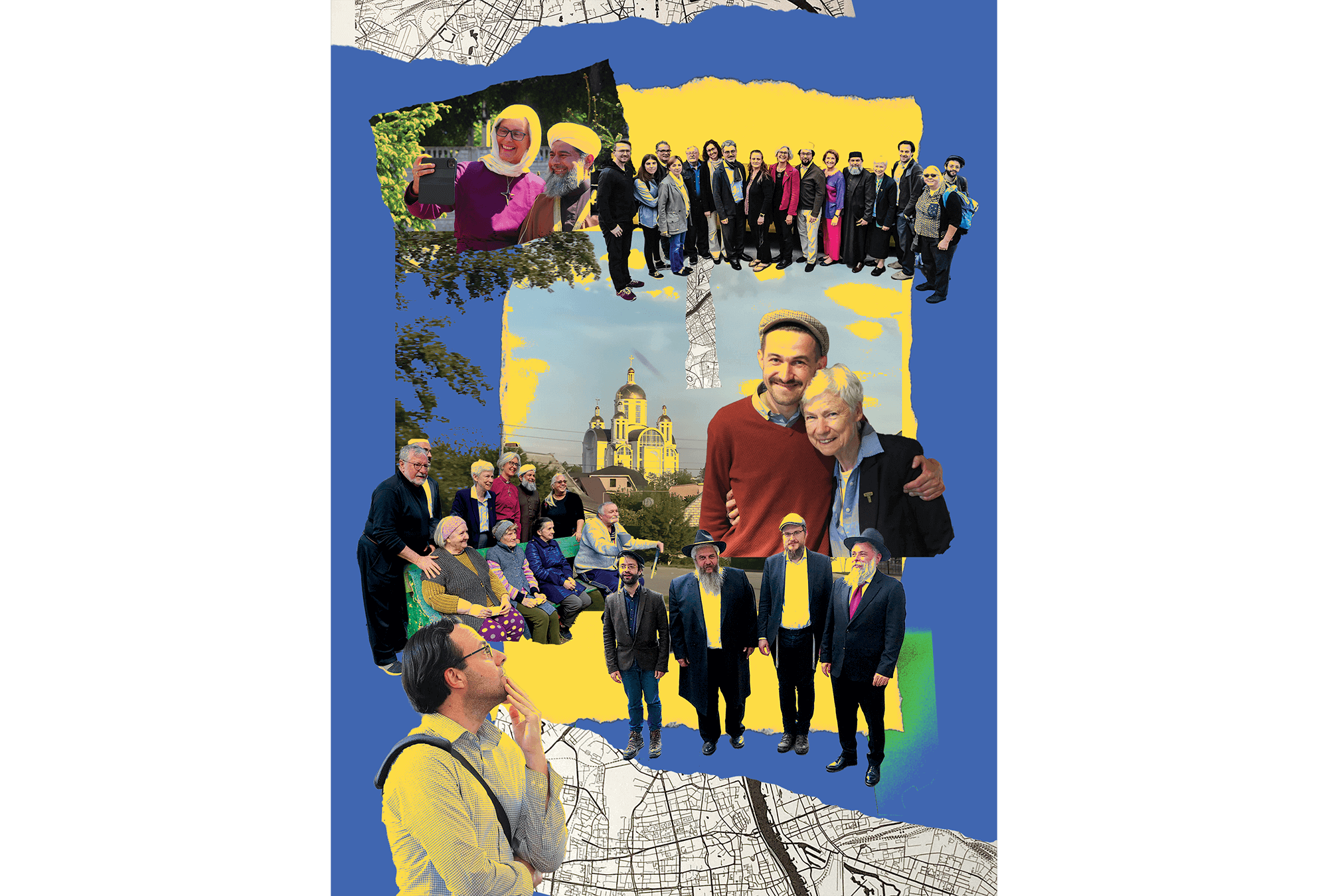
Photographs by Dawid Gospodarek / Photo collages by Candace Sanders
ON OUR FINAL evening in Kyiv, we had an extraordinary experience. At perhaps the only kosher restaurant still operating in the city, Rabbi Moshe Azman, chief rabbi of Ukraine, and Rabbi Jonathan Markovitz, chief rabbi of Kyiv, joined us for dinner. With delegation member Dawid Szychowski, we now had three Orthodox rabbis together at a table.
In the tradition of Jewish teaching, every genuine question is the start of a journey toward God, which is why Jewish parents teach their children to ask good questions and thus prompt a never-ending conversation with God. With this in mind, delegation member Maurice Glasman brought this question to the rabbis: “Is Putin Pharaoh?”
War propels existential questions to the forefront: Where is God in this? Who are we to be now? These rabbis had already been thinking and praying deeply on questions like this one.
Rabbi Markovitz answered, “When we know ourselves and know what we should do and for whom we do it, then we have no pharaoh. If we are feeding our neighbor, then there is no pharaoh, and we live liberated. But I also turn the question around and ask, ‘Is pharaoh an individual or a system?’”
Rabbi Azman then spoke. “Our situation is not a situation like Egypt and Pharaoh,” Azman said. “It is the battle of Gog and Magog, an apocalyptic battle against the enemies of God, between good and evil,” referencing scriptures in Ezekiel that point to a messianic age.
Rabbi Szychowski turned the question yet again. “I am less interested in who pharaoh is than I am in who the people are who are preparing for liberation.”
PUTIN'S WAR AGAINST Ukrainians should make American Christians very uncomfortable. Not only because of the immense human suffering, the threatened use of nuclear weapons, and the potential downstream impact of famine in Africa and the Middle East from stalled grain exports, but because our own Christian nationalism takes a page directly from Russkii Mir (“Russian World”) teaching.
Orthodox Christian theologians have labeled Russkii Mir, which has been developing for the 20 years that Putin has been in political leadership, as a false religious teaching rooted in a form of Orthodox religious fundamentalism with a goal toward building the church around a particular “race or tribe.” It’s what happens when religion cloaks ethno-nationalism with a veneer of moral rectitude.
Putin wants an ethnically pure state and Patriarch Kirill, the first head of the Russian Orthodox Church to be elected after the fall of the Soviet Union, appears to promote an ethnically pure church. These narratives are carefully crafted to destabilize neighboring countries and influence specific ethnic and religious groups within their populations. Putin intends to annihilate Ukrainians in all their historic cultural diversity and move ethnic Rus settlers into Ukrainian territory as swiftly as possible. This is brutal ethnic cleansing—but it is also an attack on the very heart of the Christian gospel.
Putin and Patriarch Kirill have used Russian World ideology as a principal justification for the invasion of Ukraine, according to Orthodox theologians in their statement “A Declaration on the ‘Russian World’ Teaching,” released in March and signed by nearly 1,500 theologians. The authors explain, “Just as Russia has invaded Ukraine, so too the Moscow Patriarchate of Patriarch Kirill has invaded the Orthodox Church ... with untold casualties not just to the body but to the soul, endangering the salvation of the faithful.” This false teaching, the authors warn, “is attracting many in the Orthodox Church and has even been taken up by the Far Right and Catholic and Protestant fundamentalists.”
In public statements Archbishop Shevchuk warned against the “pandemic of ideology” that sometimes even justifies war crimes for religious reasons. “The Russkii Mir ideology fights Christian ecumenism because it supposedly jeopardizes true Orthodox faith,” he told us. “It says it is correct to use violence in defense of faith. They even speak of ‘Orthodox nuclear weapons.’ God save us from such a [Christian] culture!”
ARISTOTLE WROTE THAT the virtue of courage lies between recklessness and cowardice. The bus back to Warsaw took us through the neighborhoods in Bucha where tattered billboards proclaim, “Life will overcome death.” We detoured around a bombed highway bridge and passed elder Ukrainians tending kitchen gardens. Ukrainians are living their courage.
At a truck stop near the Polish border, we stopped to refuel. The travel center had been transformed into a site for refugee services with a medical tent, a clothing tent, and an International Red Cross station for recharging phones and using computers to trace relatives. Chef José Andrés’ World Central Kitchen was giving out free french fries.
Sam Cooke wrote “A Change Is Gonna Come” in 1963 after his band was turned away from a “whites-only” motel in Shreveport, La. It was his ode to a people preparing for liberation.
There been times that I thought I couldn’t last for long
But now I think I’m able to carry on
It’s been a long, a long time coming
But I know a change gonna come, oh yes it will.
We crossed the Boh River back into Poland.
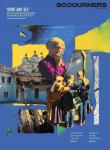
Got something to say about what you're reading? We value your feedback!